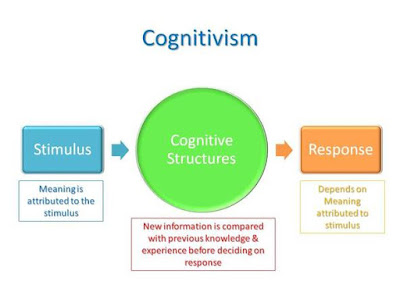Literally,
to cognize means to know, and hence cognition is knowing. Cognitivism
is the study of cognition that emphasizes the role of mental structure, or
organization.
Cognitivism involves the study of mental events rather than actual behaviors. These mental events are concerned with acquiring, processing, storing, and retrieving information. Accordingly, the main emphasis in a cognitive analysis of learning is on the learner’s mental structure.
cognitive structure:
The (learner’s)
mental structure refers to the organized totality of an individual’s knowledge;
also called cognitive structure. The mental structure is a concept
that includes not only the learner’s previous related knowledge but also the
strategies that the learner might bring to bear on the current situation. In this
view, the individual’s pre-existing network of concepts, strategies, and
understanding makes experience meaningful.
Here it
is worth mentioning that a “concept” stands for a collection of perceptual
experiences or ideas that are related because they possess common properties.
One major
emphasis of cognitive approaches concerns how information is processed and
stored.
Our current
model of cognitive functioning is essentially an information processing model. This
model looks at three things:
First, it looks at the knowledge base. The knowledge base is the storehouse of
information, concepts, and associations that we build up as we develop from
children into adults.
Second,
it looks at cognitive strategies. The
cognitive strategies refer to the process by which information becomes part of
the knowledge base; these include identifying problems, selecting approaches to
their solution, monitoring progress in solving problems, and using
feedback. The cognitive strategies are
closely related to metacognition and metamemory.
Third,
it deals with the individual’s awareness of the self as a knower and processor
of information—with what is termed metacognition.



